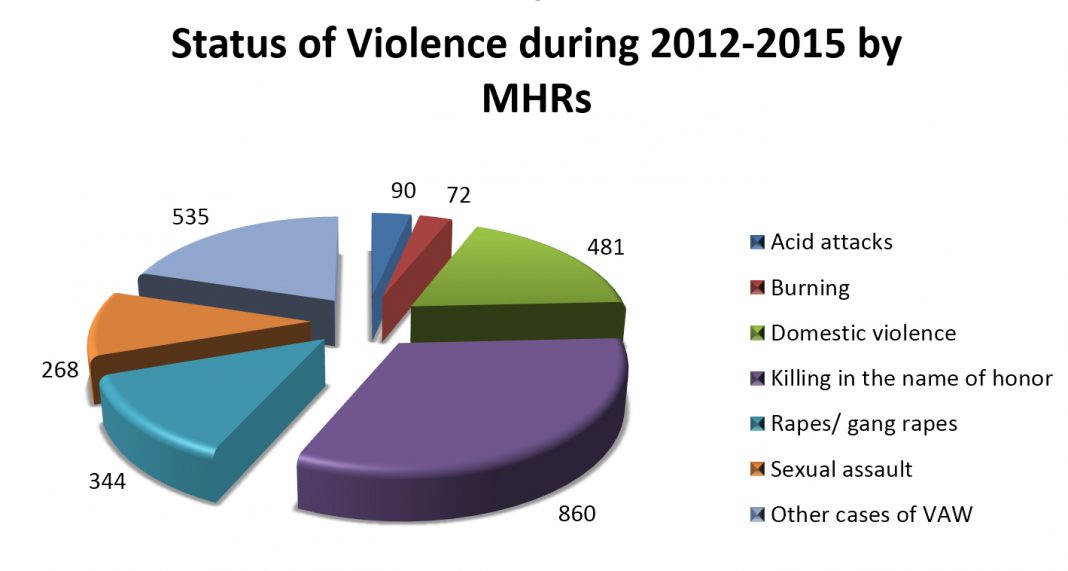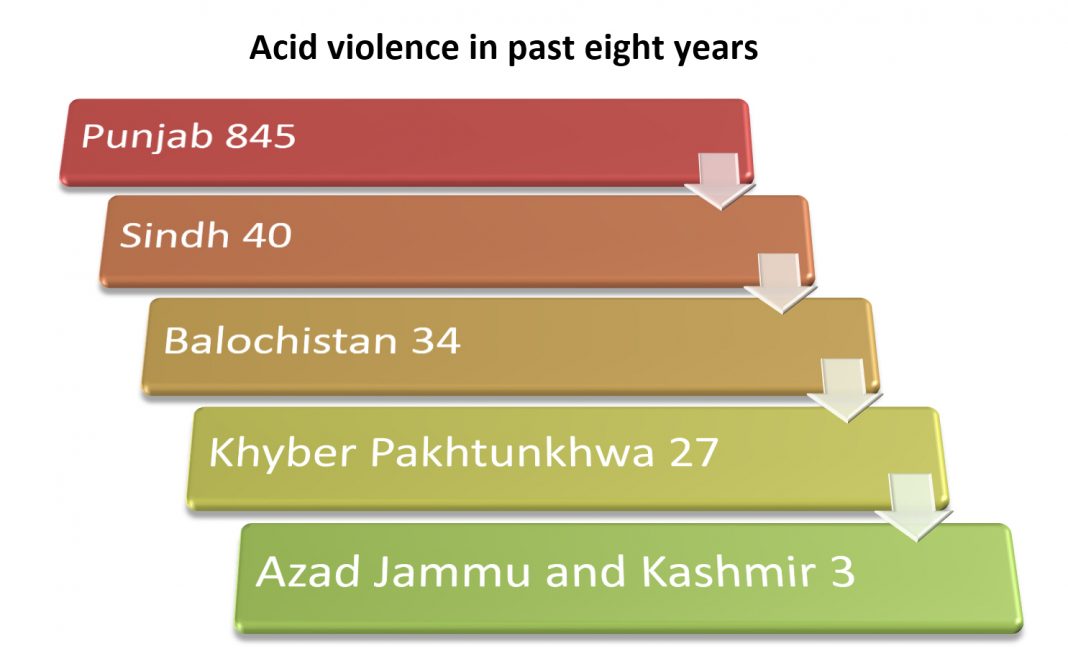Karachi: Over 27 women in Pakistan are subjected to various forms of violence on a daily basis. Violence against women claims at least five lives each day, says a report by Aurat Foundation, a women rights organization.
According to the report, the year 2014 was marked by highest incidences of violence against women (VAW) cases over the past seven years.
The global community commemorates 25th November as the international day for Ending Violence Against Women (EVAW) since 1999. From 25th November through 10th December (Human Rights Day), the 16 Days of Activism against Gender-Based Violence aim to raise public awareness and encourage people everywhere to bring about change.
The day has been commemorated to pay tribute to three political workers known as Mirabal sisters, who were assassinated on the orders of Dominican dictator Rafael Trujillo in 1960 in the Dominican Republic. Initially, the day was observed by activists alone in 1981, to pay tribute to Mirabal sisters and as a day to combat and raise awareness for Violence Against Women (VAW) more broadly; while on December 17th, 1999, United Nations (UN) declared November 25th as an international day to End Violence Against Women.
Noor Naz Agha, President of Pakistan Women Lawyers Association, while talking to News Lens Pakistan, said, “Although the article 25 of the constitution of Pakistan clearly states that all citizens are equal before Law, and there shall be no discrimination on the basis of sex, yet in every sphere of life women have been subjected to discrimination.”
The 2014 report by Aurat Foundation has been dedicated to 2 Pakistani women; Farzana Perveen, who on May 27th was beaten to death publicly outside the Lahore High Court by her close relatives for daring to marry with her free will, and Shama Masih, the pregnant mother of three children who was thrown in a flaming brick kiln due to fabricated blasphemy allegations in Qusoor district of Punjab province on November 4th.
Ms Agha further added that the Federal Government and the Sindh Government in particular, have introduced some good women friendly legislation, which is commendable. However, these laws are not benefiting the ordinary women of Pakistan due to a lack of awareness and ineffective implementation.
The Human Rights Commission of Pakistan’s (HRCP) 2015 report on human rights in Pakistan states that the First Information Reports (FIRs) of 146 incidents of domestic violence were not registered; however 747 FIRs were filed in sexual violence cases, and no complaint was filed in 44 cases. Around 88 of the victims were filmed while being sexually abused, and the footage was used by the culprits to further harass the victims, 209 kidnapped women were recovered, 53 were not found after being kidnapped. However FIRs were registered in 76 burning cases, and no complaint was registered in seven cases.
Honour crimes and acid attacks were recorded, as 987 cases of honour crimes surfaced in 2015, with 1096 female victims and 88 males. According to the research, at least 170 victims were minors.
Ministry of Human Rights official figures state that 8,648 incidents of human rights violations were reported in the country between January 2012 and September 15th, 2015. These included 90 incidents of acid burning, 72 of burning, 481 of domestic violence, 860 honour killings, 344 rape and gang rapes, 268 sexual assault/harassment, and 535 cases of VAW.

The Gender Gap Index 2015 ranked Pakistan second last among 145 countries in terms of the prevalence of gender-based inconsistencies. Published annually by the Geneva-based World Economic Forum (WEF), the Index measures national gender gaps in economy, politics, education and health. Released on November 20th, the Index ranked Pakistan 143rd in economic participation and opportunity, 135th in educational attainment, 125th in health and survival and 87th in political empowerment.
Iqbal Detho, Human Rights defender based in Karachi said, “All mechanisms required for the implementation of the laws should be put in place. Prosecution rate for violence against women must be increased to create a safer environment for women.
HRCP report positions that the highest number of cases occurred in south Punjab with 643 cases of acid violence reported in the past eight years, followed by central Punjab with 202 cases, Sindh 40, Balochistan 34, Khyber Pakhtunkhwa 27, Azad Jammu and Kashmir three cases.

A police officer, who wishes to remain anonymous as she is not authorised to speak to the media, said, “The low conviction ratio in murder cases of women was due to a lack of evidence, and in many cases, parties enter settlements. Investigators do not collect proper evidence at times, and the accused gets leniency from courts and long delays in verdicts leads to Jirgas (local council of tribal elders) and out-of-court settlements.”
The HRCP report shows that measures such as economic empowerment of women through large-scale programmes with widespread outreach should be put into place to provide them with autonomy, which will help eradicate cases of violence against women. The government should fulfill its commitments regarding the development of women. Reproductive rights of women must be respected and family planning services should be made available to both men and women. The ratio of women included in the national decision making processes must be increased and all women should be able to fully exercise their voting rights.
The role of women in the media must be enhanced with equal pay policies, inclusion in decision making processes and ending the objectification of women in the media. Law enforcement agencies must adopt non-discriminatory recruitment policies that provide equal opportunities to both men and women to join the force.
“Being a woman, I would suggest that in murder cases of women, the state should become the party to prevent local settlements and to increase the conviction ratio, which is dangerously low in our country, “ observed the police officer.
A leading human rights defender, Tahira Abdullah said that there is ‘no honour” in killing. The media must stop glorification of the killers and its sensational masala coverage of ‘dishonour’ killings “This is a very serious crime and the media must treat it with seriousness and respect for the victim and her family – and must implement the voluntary Code of Ethics,” she added.




Thank you Lala for this informative and analytical reading